




 he role of the German churches during the Third Reich is a topic that emerges out of our deepest concerns. Both of us were raised in religious households, Bob as a Lutheran, Susannah as an Orthodox Jew. As students we strove to integrate our studies, our religious roots, and the ethical issues of our day. As a child, Susannah was deeply influenced by the role of religious leaders in the Civil Rights Movement and the effort to end the war in Vietnam. Bob, growing up in the Pacific Northwest, came of age as the Civil Rights Movement gradually undermined comfortable assumptions about the moral quality of American life, assumptions further called into question by the escalation of America's role in Vietnam. For both of us, political engagement has been an essential component of religious commitment and a test of the moral integrity of religious leaders.
he role of the German churches during the Third Reich is a topic that emerges out of our deepest concerns. Both of us were raised in religious households, Bob as a Lutheran, Susannah as an Orthodox Jew. As students we strove to integrate our studies, our religious roots, and the ethical issues of our day. As a child, Susannah was deeply influenced by the role of religious leaders in the Civil Rights Movement and the effort to end the war in Vietnam. Bob, growing up in the Pacific Northwest, came of age as the Civil Rights Movement gradually undermined comfortable assumptions about the moral quality of American life, assumptions further called into question by the escalation of America's role in Vietnam. For both of us, political engagement has been an essential component of religious commitment and a test of the moral integrity of religious leaders.
We first met in December 1992, at a conference where we each presented our research on pro-Nazi Protestant theologians. During the summer and fall of 1993 we collaborated on an article reviewing the historiography on German churches during the Third Reich. By 1994 we had become good friends as well as colleagues and began to plan an edited volume of essays, which eventually became this book.
We are very grateful to our contributors to this volume. Shelley Baranowski, Kenneth Barnes, Doris Bergen, Micha Brumlik, and Michael Lukens each produced valuable contributions. Victoria Barnett, a close friend and colleague who also works in this field, was kind enough to translate Brumlik's article from German into English. Guenter Lewy graciously gave us permission to reprint an article he published some years ago on the German Catholic church; we also thank Commentary magazine for granting us permission to reprint that article. The contributors to this volume constitute a core group of scholars concerned with the history of the German churches, paying particular attention to the churches' attitudes toward Jews and Judaism. We appreciate their willingness to synthesize the findings of their archival research for a broader audience.
We are also indebted to Marshall Johnson, recently retired editor in chief of Fortress Press and himself a scholar of theologians in the Nazi era, for his support of this project. As all scholars in our field know, we have been lucky to have him as our editor. We also want to thank Michael West, who became our very able editor after Marshall's retirement; Patricia Heinicke, for her superb editing of the manuscript; and Julie Odland Smith for producing the book.
We would like to express our thanks to the many archivists who have helped us gather material, at the Berlin Document Center, the Hauptstaatsarchiv Niedersachsen, the Universitatsarchiv Giessen, the Universitatsarchiv Gottingen, the Universitatsarchiv Jena, the Bundesarchiv in Koblenz and in Potsdam, the Landeskirchlichesarchiv in Hanover, the Landeskirchenarchiv of Thuringen, the Zentralarchiv der Kirche in Berlin, the YIVO Institute archives in New York City, and the Wiener Library of Tel Aviv University. In particular, Susannah would like to thank Rev. Heinz Koch, director of the Landeskirchenarchiv of Thuringen and himself an expert on church activities during the Third Reich, and Rev. Beatrix Jessberger of Berlin, whose friendship made possible the many arduous trips to archives throughout Germany.
Many colleagues have contributed suggestions and advice, including Hans-Joachim Dahms, Louis Graham, Jorg Ohlemacher, Philip Schaeffer, David Toren, Donald Niewyk, Michael A. Meyer, Richard Cogley, David Bankier, Dieter Georgi, Irmtraud Fischer, Peter von der Osten-Sacken, Christian Wiese, Siegfried Virgils, Joseph Tyson, and Christoph Raisig.
Both of us have been allowed research time through the generosity of several fellowships. Bob would like to thank the Alexander von Humboldt Foundation and the National Endowment for the Humanities. Susannah would like to thank the Cleveland Foundation, the Samuel Rosenthal Center for Judaic Studies at Case Western Reserve University, and the National Humanities Center, which granted her a fellowship during the academic year 1997-98, supported by the Rockefeller Foundation and the Lucius Littauer Foundation.
Most important, we thank our partners, Judith Meyers and Jacob Aronson, for their constant support and encouragement. As academic colleagues as well as spouses, they have given thoughtful consideration to our research and have raised important and critical insights. They are the two finest human beings we know.

 ranz Stangl, the future commandant at the death camp Treblinka, worked during the early war years in the so-called Euthanasia Program of the German Reich. Far from "mercy killing," this program permitted the murder of patients (children as well as adults) who were deemed mental, physical, or social burdens on society-"life unworthy of life," as they were designated. "No law compelled the killings"; rather, a bureaucratic structure was established that permitted medical personnel to transfer certain patients to designated killing centers. Physicians, nurses, and orderlies participated voluntarily in the program, while the patients themselves often pleaded for their lives or tried to flee the hospital. Patients' families were told that the patients had died of natural causes. Stangl himself apparently had some moral doubts about the murders. In November 1940, he took the time to visit a hospital, run by a Catholic order of nuns, in order to locate a keepsake belonging to a child patient who had been put to death. The child's mother had received notice of the supposedly natural death and had also been sent the child's toys and other effects, but a candle she had given her daughter was missing and she wanted it back.
ranz Stangl, the future commandant at the death camp Treblinka, worked during the early war years in the so-called Euthanasia Program of the German Reich. Far from "mercy killing," this program permitted the murder of patients (children as well as adults) who were deemed mental, physical, or social burdens on society-"life unworthy of life," as they were designated. "No law compelled the killings"; rather, a bureaucratic structure was established that permitted medical personnel to transfer certain patients to designated killing centers. Physicians, nurses, and orderlies participated voluntarily in the program, while the patients themselves often pleaded for their lives or tried to flee the hospital. Patients' families were told that the patients had died of natural causes. Stangl himself apparently had some moral doubts about the murders. In November 1940, he took the time to visit a hospital, run by a Catholic order of nuns, in order to locate a keepsake belonging to a child patient who had been put to death. The child's mother had received notice of the supposedly natural death and had also been sent the child's toys and other effects, but a candle she had given her daughter was missing and she wanted it back.
That's why I had to go there: to find the candle. When I arrived, the Mother Superior, who I had to see, was up in a ward with the priest and they took me up to see her. We talked for a moment and then she pointed to a child-well, it looked like a small child-lying in a basket. "Do you know how old he is?" she asked me. I said no, how old was he? "Sixteen," she said. "He looks like five, doesn't he? He'll never change, ever. But they rejected him." [The nun was referring to the medical commission.] "How could they not accept him?" she said. And the priest who stood next to her nodded fervently. "Just look at him," she went on. "No good to himself or anyone else. How could they refuse to deliver him from this miserable life?" This really shook me... Here was a Catholic nun, a Mother Superior, and a priest. And they thought it was right. Who was I then, to doubt what was being done?'

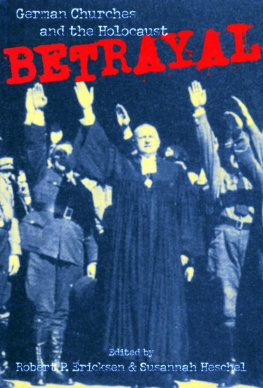
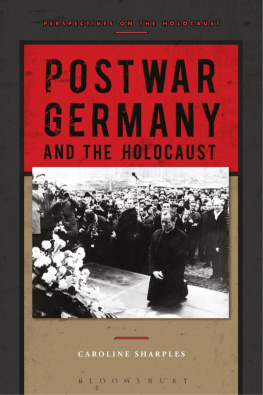
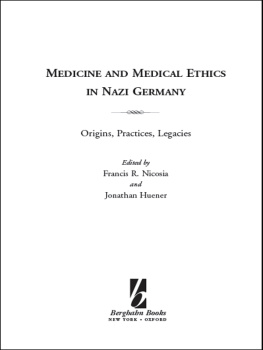

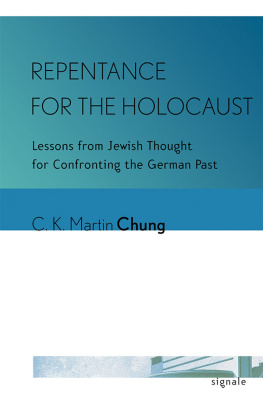

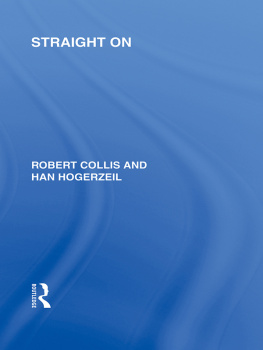
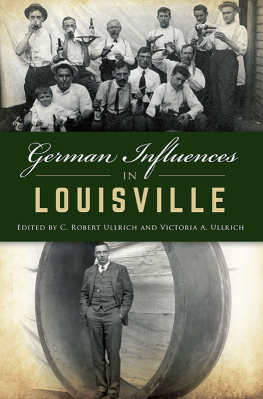
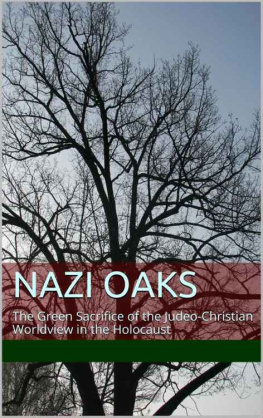
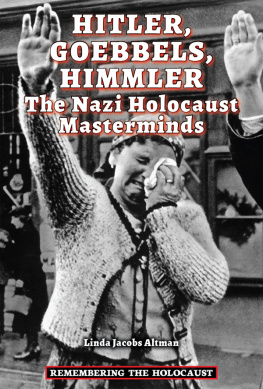






 he role of the German churches during the Third Reich is a topic that emerges out of our deepest concerns. Both of us were raised in religious households, Bob as a Lutheran, Susannah as an Orthodox Jew. As students we strove to integrate our studies, our religious roots, and the ethical issues of our day. As a child, Susannah was deeply influenced by the role of religious leaders in the Civil Rights Movement and the effort to end the war in Vietnam. Bob, growing up in the Pacific Northwest, came of age as the Civil Rights Movement gradually undermined comfortable assumptions about the moral quality of American life, assumptions further called into question by the escalation of America's role in Vietnam. For both of us, political engagement has been an essential component of religious commitment and a test of the moral integrity of religious leaders.
he role of the German churches during the Third Reich is a topic that emerges out of our deepest concerns. Both of us were raised in religious households, Bob as a Lutheran, Susannah as an Orthodox Jew. As students we strove to integrate our studies, our religious roots, and the ethical issues of our day. As a child, Susannah was deeply influenced by the role of religious leaders in the Civil Rights Movement and the effort to end the war in Vietnam. Bob, growing up in the Pacific Northwest, came of age as the Civil Rights Movement gradually undermined comfortable assumptions about the moral quality of American life, assumptions further called into question by the escalation of America's role in Vietnam. For both of us, political engagement has been an essential component of religious commitment and a test of the moral integrity of religious leaders.
 ranz Stangl, the future commandant at the death camp Treblinka, worked during the early war years in the so-called Euthanasia Program of the German Reich. Far from "mercy killing," this program permitted the murder of patients (children as well as adults) who were deemed mental, physical, or social burdens on society-"life unworthy of life," as they were designated. "No law compelled the killings"; rather, a bureaucratic structure was established that permitted medical personnel to transfer certain patients to designated killing centers. Physicians, nurses, and orderlies participated voluntarily in the program, while the patients themselves often pleaded for their lives or tried to flee the hospital. Patients' families were told that the patients had died of natural causes. Stangl himself apparently had some moral doubts about the murders. In November 1940, he took the time to visit a hospital, run by a Catholic order of nuns, in order to locate a keepsake belonging to a child patient who had been put to death. The child's mother had received notice of the supposedly natural death and had also been sent the child's toys and other effects, but a candle she had given her daughter was missing and she wanted it back.
ranz Stangl, the future commandant at the death camp Treblinka, worked during the early war years in the so-called Euthanasia Program of the German Reich. Far from "mercy killing," this program permitted the murder of patients (children as well as adults) who were deemed mental, physical, or social burdens on society-"life unworthy of life," as they were designated. "No law compelled the killings"; rather, a bureaucratic structure was established that permitted medical personnel to transfer certain patients to designated killing centers. Physicians, nurses, and orderlies participated voluntarily in the program, while the patients themselves often pleaded for their lives or tried to flee the hospital. Patients' families were told that the patients had died of natural causes. Stangl himself apparently had some moral doubts about the murders. In November 1940, he took the time to visit a hospital, run by a Catholic order of nuns, in order to locate a keepsake belonging to a child patient who had been put to death. The child's mother had received notice of the supposedly natural death and had also been sent the child's toys and other effects, but a candle she had given her daughter was missing and she wanted it back.